Tags abbreviated audio, audio book, blog, Guest Contributor, interview, Jo Anna Perrin, narrator, news, Robert Fass
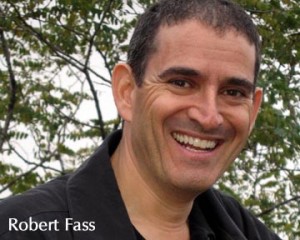 Equally at home in a vast variety of fiction and non-fiction genres, styles, characters and dialects, Robert Fass has been reviewed in AudioFile Magazine as “masterful”, earning praise for his “crisp narration”, “personal touch,” and “distinct characterizations” in titles by such modern and classic masters as Ray Bradbury, Joyce Carol Oates, Isaac Asimov, Jeffery Deaver and John Steinbeck. He is a three-time Audie nominee and just won his first Audie for Empire of Liberty by Pulitzer-Prize winning historian Gordon S. Wood; he was also a 2009 Grammy candidate for Anticancer: A New Way of Life by Dr. David Servan-Schreiber. He lives in New York City.
Equally at home in a vast variety of fiction and non-fiction genres, styles, characters and dialects, Robert Fass has been reviewed in AudioFile Magazine as “masterful”, earning praise for his “crisp narration”, “personal touch,” and “distinct characterizations” in titles by such modern and classic masters as Ray Bradbury, Joyce Carol Oates, Isaac Asimov, Jeffery Deaver and John Steinbeck. He is a three-time Audie nominee and just won his first Audie for Empire of Liberty by Pulitzer-Prize winning historian Gordon S. Wood; he was also a 2009 Grammy candidate for Anticancer: A New Way of Life by Dr. David Servan-Schreiber. He lives in New York City.
Find Robert on-line at AudioFile Magazine and a partial list of his audiobooks is available at Audible.
Recent Update:
Robert Fass and I started this interview over several weeks, in fits and starts, and through a few transformations, as changes in Robert’s audio life occurred since the inception of this interview. One notable one is his 2011 Audie award for Empire of Liberty which he recently garnered in NYC at the 16th Annual Audie Awards ceremony celebrating excellence in the audio book industry. I couldn’t resist a few extra questions, so here at last is the final permutation.
AA/JP: Congratulations on your win. Any post Audie thoughts? 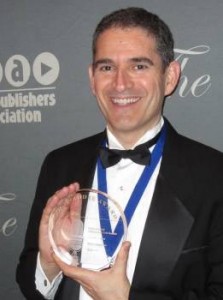
RF: It feels great to have received the honor. I’ve got a long way to go in this business, and it’s a nice sense of confirmation that I’m headed in a good direction and that the momentum I’m enjoying at the moment is likely to continue. I truly didn’t know what to expect, and so had checked any expectations at the door. On the one hand, I was just wide-eyed and thrilled to be presenting and in such company; on another hand, I haven’t been around long enough to know if there are dynamics like with the Oscars in the sense of, say, there being sentimental favorites (for instance, Howard Zinn passed away last year and I was competing with his son’s narration of A People’s History of the United States), or whether a 31-hour title like Empire of Liberty would be at a disadvantage to a 12-hour fellow nominee. And on the third hand, if you have ambitions to stick around, which I do, then being an Audie nominee and winner does seem to have nudged a few doors open a little further that I’ve been knocking on for a little while.
AA/JP: Would you like to thank anyone in particular?
RF: I’m grateful to Audible for asking me to narrate the 31-hour book, and for bringing me back last fall to narrate an additional four volumes (115 hours) from the series; Gordon S. Wood is widely considered the preeminent historian of the Revolutionary War period, and I’m fortunate to have had the opportunity to narrate his big ideas. In fact, I was lucky enough this spring to read his new book, The Idea of America, for Penguin Audio.
AA/JP: Having mentioned the Oscars, there is the famous curse of the Oscars…we have to hope, ahem, assume, there is no similar limbo for the Audies! I’ve never tracked this though, any thoughts?
RF: Can’t say about the Curse of the Oscars…where do those winners go? It’s LA, I figure they go to their cars ( where of course, they listen to audiobooks…)
AA/JP: And, yes, Robert, of course they do.
About Audio Books:
AA/JP: How did you get started in audio books?
RF: I’ve been doing theatre since I was a child. And I’ve always loved spoken word recordings. I used to haunt the public library and bring home comedy albums, recordings of ghost stories, box sets of British and American theatre productions, original cast recordings from Don Juan in Hell, Who’s Afraid of Virginia Woolf, light and fluffy kid stuff like that. My friends and I used to make home recordings of various types – everything from sitting around an old reel-to-reel inventing stories to making prank phone calls with a microphone on the line. (Long before the Jerky Boys.)
My dad was a volunteer reader for the blind for 25 years, both live and recorded, and he served on the board of the RFB&D in Washington, DC. After he died, in his honor I began volunteering at the InTouch Network where I spent 11 years reading The New Yorker every week to the blind and visually impaired. It was a great training ground, especially with the variety and quality of writing in that magazine, politics, essays and short fiction. Through a fellow volunteer there, I attended a seminar that the APA offered back around 2004 when they were looking to introduce more theatrically-trained actors into the narrator community. That led to an opportunity to have a sample track evaluated by a producer, Max Bloomquist at Brilliance. He encouraged me enough that I made a full demo; I was very lucky there, because I had a friend at an ad agency who gave me free access to a professional studio and a staff engineer who was willing to work in exchange for a bottle of Jack Daniels. I sent it to every producer in the APA reference guide, and immediately got responses from Laura Wilson at Audio Renaissance (now Macmillan) and Sue Mackewich at Gizmo. Laura gave me my first job, a thriller by Jeffery Deaver, and Sue auditioned me for a project she was casting. I didn’t get that job, but unbeknownst to me she began circulating my audition recording as a sample for various projects, and after about a year, based on that sample, Ray Bradbury picked me to narrate Farewell, Summer, his 50-years-in-the-making sequel to Dandelion Wine. That was very well reviewed and led to a wonderful relationship with the Gizmo folks (now BAM) and BBC/AudioGo that continues to this day.
AA/JP: How do you prepare for recording an audio book?
RF: Prep time has generally dwindled in the past few years, but I’d say I still typically do the following:
Read the book! Sounds dumb to say, but I have heard of readers who go into the studio completely cold; some are apparently brilliant at it (though I don’t know what happens if they get to page 300 and find they’ve made a completely wrong choice on a character voice). I need to know what happens, know what the book’s about, and know what the author’s viewpoint is. It’s our job as narrators to communicate all that. The more time I have to sift and re-read, the better.
If it’s fiction, I make a character grid. I note everything that is said about the character’s voice, attitude, origin, physicality, anything that will help me find him or her. I also note whether they are a major, supporting, or incidental figure in the book, and I pay attention to who else they talk to in the book. You don’t want to run into problems when on page 5 you arbitrarily pitch a character a certain way and on page 150 you pitch another character in a similar way, and on page 200 they meet for the first time and the listener can’t tell them apart.
If there’s a lot of dialogue, I will get out my colored highlighters and color-code the lines so I remain on top of who’s speaking.
Simultaneously, I make a pronunciation list. Like a lot of narrators, I typically do my own pronunciation research. I know a lot of people hire folks to do that for them, and that can be a great time-saver; but I’m finicky and so far when it’s been done for me I still tend to find the occasional mistake. Then comes some pretty intensive research on any number of sites from dictionaries to dialect archives to YouTube, as well as making phone calls to experts, scholars, consulates, restaurants, and the like. Some publishers will provide you with an author contact so you can verify pronunciations or other aspects of the book that only they would definitively know (though I’ve been steered wrong by authors too). Other publishers will keep you as far away as possible from the author.
Beyond that, I try to have my instrument in shape – watch what I eat, start hydrating the day before, avoid alcohol and tea, and make sure I stock up on good stuff I like to have in the booth like Throat Coat tea and Entertainer’s Secret.
AA/JP: Do you have a favorite audio book?
RF: So many. Somewhere I still have the Caedmon recording (abridged, alas) of James Mason reading Lolita, which I love. That famous opening sequence is perfectly rendered. (I haven’t heard the Jeremy Irons unabridged version but I expect it’s great too.) Another that comes to mind is an obscure George Orwell book called Keep the Aspidistra Flying, which got a fantastic read by the late Patrick Tull.
AA/JP: Which book so far, has been the most challenging and why?
RF: Probably it would have to be The Acts of King Arthur and His Noble Knights by John Steinbeck. I took it on under a very tight deadline and pretty early in my narrating career. Steinbeck never finished it, and some chapters were little more than first drafts (though of course they were Steinbeck, no slouch as a writer). It turned out to have 160 different characters – I broke Jim Dale’s Guinness world record, unofficially at least – some of whom had dialects I was totally unfamiliar with. I had to play twin brothers from Northumberland, for instance. I’m facile with accents, but it was a real challenge to sustain so many voices that were not in my wheelhouse, especially during stretches of back-and-forth dialogue. The engineer kept having to play me back reference tracks, sometimes practically every time I switched characters. I learned a lot from that one.
AA/JP: How do you feel about recording in a professional studio with a director in comparison to using your own studio?
RF: Give me a pro studio and a director every time. Having multiple sets of ears on a recording is always an advantage for the end result. But that’s not the way the industry is moving, so we all have to hone our self-directing abilities. I’ve been a theatre director so I think I have a pretty good sense of how to do that; but I’m still learning what works in the booth. Also, in my own studio I can shout and cuss at myself. And at the helicopters.
AA/JP: As you have your own studio, what software do you use?
RF: I work with the new Tantor program, which allows for multiple takes and notes to the engineers. I think that’s a nice improvement. And I’ve just begun using ProTools on my Mac for working with other publishers from home.
AA/JP: What are the challenges to your home studio?
RF: Currently it’s external noise, but that’s changing because I’ll be moving in a few months. Right now I’m in a small one-bedroom on the upper west side, and even though I have no street noise, I’m right under the flight path of the helicopters and small planes that come droning up the Hudson every 5 minutes. I’ve also got a noisy steam pipe and two buildings right outside that seem to constantly need re-pointing. I’ve built dense foam window plugs, and they definitely help, but a lot of stuff still gets in and I just have to pause until the sound subsides. My wife and I are buying an apartment this summer, though, that’s big enough for me to have an iso booth. We’ll be on the 14th floor in a quiet neighborhood just north of Manhattan, and I’m looking forward to being able to work a lot faster.
AA/JP: What are you working on right now?
RF: I’ve just finished a pair of titles. The first is a new history from John Ferling, entitled Independence: the Struggle to Make America Free. The other is Blood of the Reich, a new thriller by William Dietrich, inspired by actual events in 1938 when Himmler sent a team of Nazi scientists to search for a powerful secret weapon in the wilds of Tibet. I did the WWII-era chapters, and Ilyana Kadushin, who narrated the Twilight series, handled the present-day chapters. Very Raiders of the Lost Ark stuff, with lots of German voices. I’m currently doing yet another thriller with Nazis in it – this one’s a kind of Matrix/Avatar/Da Vinci Code tale that’s got me voicing 86 characters, mostly Greek, German, and British (including Hitler, Churchill, Eisenhower and others). After that, it looks like I’ll be continuing the European trend with a detective novel set in 1900s Vienna. (Maybe I can get BBC/AudioGo to send me over there for research purposes…)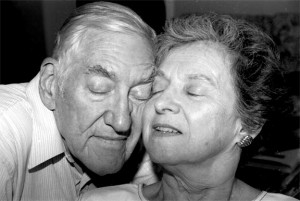
About You:
AA/JP: Obviously listeners know you as a sterling narrator. But, the buck doesn’t stop there. Tell us a little about your ambitious “As Long As We Both Shall Live” project.
RF: Thanks for the opportunity to talk about it! As Long As We Both Shall Live is a real labor of love, a documentary essay on long-married couples in America that combines formal and environmental black-and-white portraiture with in-depth interviews to examine the changing institution of marriage in 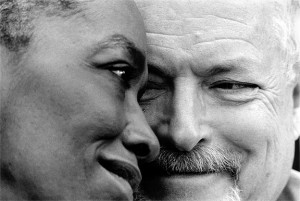 the United States. I travelled around the country with a Nikon F and a mini-cassette recorder and photographed and interviewed over three dozen couples, among them an Auschwitz death march escapee and his wife in Ohio; fundamentalist Christians in Texas; and a homosexual priest and his wife of over 50 years in Roanoke, VA. I spent time in the homes of couples ranging from the descendants of Oregon pioneers and Virginia slaves to first generation immigrants from Vietnam, Cuba and elsewhere. They told me their stories, how they feel about marriage, how it’s changed since their day. All the participating couples had been married for 40 years or longer (even as long as 73 years) when I visited with them.
the United States. I travelled around the country with a Nikon F and a mini-cassette recorder and photographed and interviewed over three dozen couples, among them an Auschwitz death march escapee and his wife in Ohio; fundamentalist Christians in Texas; and a homosexual priest and his wife of over 50 years in Roanoke, VA. I spent time in the homes of couples ranging from the descendants of Oregon pioneers and Virginia slaves to first generation immigrants from Vietnam, Cuba and elsewhere. They told me their stories, how they feel about marriage, how it’s changed since their day. All the participating couples had been married for 40 years or longer (even as long as 73 years) when I visited with them.
It’s neither a pro-marriage nor an anti-marriage project. It just gives voice to a wise, witty, profoundly diverse and plain-spoken community of older Americans that many people consider to be a vanishing species – those in enduring marriages – and was created at a time when the debate over what defines a marriage was just reaching a fever pitch (which is still raging, of course).
The resulting work led to a major solo exhibition at the 92nd Street Y in NY in 2005, followed by a 31-month European tour that started with an invitation to exhibit and lecture on the work at an international conference on aging in Berlin. The catalog I published to accompany the exhibitions brought opportunities for me to appear on several major networks’ morning shows, as well as All Things Considered and other syndicated radio shows, plus features in newspapers and periodicals around the country and abroad. I’m still hoping to find a publisher to bring it out as a full book including the interview text; I came close several times, but so far that’s proved elusive despite the praise the project has received.
The greatest reward of all was that it led directly to my own marriage after 48 years of singleguyness. I was invited to give a slide lecture on the project in Vienna, Austria, in the fall of 2005. I was there for 24 hours, and at that event I spied a gorgeous woman from the British Embassy… our eyes met across the crowded room, the whole thing. We managed an 18-month transatlantic courtship and engagement, got married in 2007, and she immigrated to the States a year later. (Serious props to Skype for enabling that…)
AA/JP: How did the project come about, what was the impetus?
RF: The project grew out of very personal beginnings. During a vacation visit with my parents, who were married for 47 years, I convinced them to sit for a couple of portrait sessions. My father suddenly and unexpectedly passed away a couple of months later and the photos were displayed at his memorial service, where they made a strong impression on a number of people and took on a new, archival resonance for me. Not long after, lifelong friends of theirs who were also long-married asked me if I would make their portrait in a similar style, and the idea struck me in that moment that it would be a great theme for a photographic exploration. I added the interview component soon after, and just began talking about it to different people. The more I did, the more people began suggesting couples for me to talk with and, over time, the work just grew. Whenever I had an acting job out of town, or a writing residency at an artist community, I was able to meet one or two local couples that were willing to share their stories with me. And by the time 7 or 8 years went by, something quite remarkable had taken shape. Along the way, I built a website (www.longmarriedcouples.com) to display the work and have received e-mails and inquiries from all over the world about the project, often hearing the writers’ stories of their own marriages or those of their parents and grandparents. I’m very proud of As Long As We Both Shall Live and pleased to have remained close with a great many of the participants.
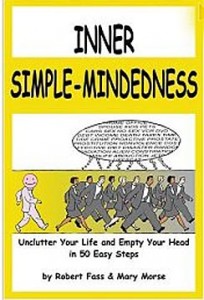 AA/JP: Now from the sublime to…How did Inner Simple-Mindedness come about?
AA/JP: Now from the sublime to…How did Inner Simple-Mindedness come about?
RF: Now you’re flying to the other end of the spectrum. A friend of mine who knew I was going through a tough stretch years ago gave me a copy of a little paperback called Inner Simplicity, one of those next-to-the-cash-register-at-Barnes-and-Noble gift books full of what’s meant to serve as inspiration and guidance to the victims of overstressed lifestyles. The subtitle was 100 Ways to Regain Peace and Nourish Your Soul. The only thing this book nourished was my cynical side. It was filled with these short entries with such sage advice as, “take time every day to think.” Not the sort of book you give to a guy whose college honors thesis was on Samuel Beckett’s contributions to 20th-century comic theory. So before you could say, “self-actualization”, I’d whipped off a parody entry to a dear friend and college classmate of mine, a very clever and funny fellow cynic named Mary Morse, up in St. Paul, MN. She said it was the funniest thing she’d read in ages and I asked her if she wanted to collaborate on a full-length skewering of this sort of simple-living self-help stuff. She jumped at the idea, and we collaborated via e-mail, sending each other ideas for topics and titles, challenging each other, and then reading the results to each other over the phone and peeing our pants laughing. In the end we had a somewhat juvenile, occasionally sophisticated book called, Inner Simple-Mindedness: Unclutter Your Life and Empty Your Head in 50 Easy Steps. We really did it more for our own amusement than anything else. But we had the opportunity to publish it for very little cost, so we did. Never marketed it much, but we made our entire investment back in the first month.
AA/JP: Can you describe its philosophy in a single sentence?
RF: It’s simple! Take no responsibility for ANYTHING. Sorry, that was two sentences, or three if you count this one.
AA/JP: As a writer, do you have any other ventures in the works?
RF: I do indeed have a significant portion of a serious novel completed that’s been lying dormant and unfinished for a while. The manuscript-in-progress won me several writing fellowships and artist residencies in the US and elsewhere, but eventually I could only work on one time-consuming, non-remunerative project at a time, and As Long As We Both Shall Live was where my energies went. I was pleased to be invited to give a public reading last year from the novel, and it was quite well received. Will I ever complete it? Not this year, at any rate. But for any publishers out there, I’ve got several completed chapters I’m happy to submit!
AA/JP: As your talents are so varied, do you consider yourself first an actor/photographer/writer/interviewer or an all-around hyphenate!?
RF: I consider myself an artist first… which I think neatly sidesteps your question, doesn’t it? Whatever I do, I strive to engage in an active dialogue – whether it’s with a fellow performer, a live or a listening audience, a photographic subject, an interviewee, a reader, a student, someone I’m coaching, or any fellow member of my community – and operate as purely in the moment as I can. As a long-time improviser, that attitude/muscle/skill set is coming into play in everything I do.
AA/JP: Which of these hats is closest to your heart.
RF: The hyphen.
AA/JP: Why?
RF: Because it symbolizes connection and, for me, that’s what it’s all about.
AA/JP: Are there any new projects of any kind you’d like to make known?
RF: I have high hopes for the audiobook of Francisco Goldman’s Say Her Name, which was released last month by Tantor. It’s a phenomenal piece of writing and I’m thrilled to have had the opportunity to narrate it. But whatever happens with any particular title, my real project now is Me in This Profession. Given the fact that I’ve just won my first Audie award and will be moving into a new space with a pro home studio, audiobooks are front and center now. Since I’m still a relative newcomer to the industry, I’m looking to grow my relationships with existing publishers as well as make further inroads with those I haven’t worked with yet. I want to continue to invest in my skills, and to get to know more people in this amazing community.
Just for the Hell of it:
AA/JP: What do you think is the greatest invention in your lifetime?
RF: Part of me wants to say the Stones’ Exile on Main St. But I think I’ll go with this: when I was seeking a long-married trucker couple for my project, searching through various trucking industry websites, I discovered there’s something called “Anti Monkey Butt Powder”. I ordered a jar from their website. And when I see it sitting there on my bookshelf every now and again, it reminds me just how lucky we are to live in a brave new world that has such wonders in it.
AA/JP: I may be being naive, but WHAT is monkey whats-it salve for?
RF: If you have to ask…
No but seriously… it’s for chafing! Long-distance truckers sitting all day, wearing those blue jeans… use your imagination. They also market it to dirt-bike racers and, I just discovered on their website earlier today, soldiers in the desert.
AA/JP: And there you have the always funny, eloquent and charming Robert Fass. Thanks Robert, for participating with me here at Abbreviated Audio, and for being so generous with your time/life/words.
Exhibition Pictures: Top right: Irwin & Evelyn, Chevy Chase, MD (1997) © Robert Fass
Bottom Left: Pat & Bob, New York, NY (2004) © Robert Fass
Inner Simple-Mindedness: Unclutter Your Life and Empty Your Head in 50 Easy Steps © Robert Fass & Mary Morse

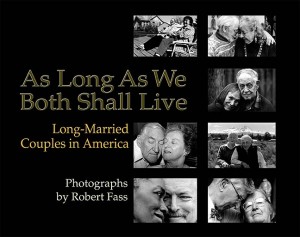

[…] can discover more about Robert in this excellent Abbreviated Audio interview and you can find him […]